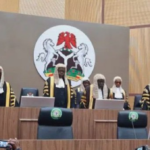In furtherance of its New Vision development agenda for the Niger Delta, the Buhari Administration will ensure the completion of the critical projects it has embarked upon in the region, according to Vice President Yemi Osinbajo, SAN.
Prof. Osinbajo who was represented at the event by the Senior Special Assistant to the President on Niger Delta Affairs, Office of the Vice President, Mr. Edobor Iyamu, stated this on Tuesday at the 6th Anniversary Lecture/Niger Delta Awards Organised by Gbaramatu Voice Newspaper, which held in Lagos.
- PODCAST: Tanker Drivers To Face The Music Over Road Crashes
- Borno Govt demolished more mosques than churches – MURIC
“In 2017, following my tour of the Niger Delta, which involved extensive consultations with key stakeholders in the region, the New Vision for the Niger Delta was birthed in response to the various challenges which had been plaguing our people.”
“The objective of this New Vision is to ensure that the people of the region benefit maximally from their wealth, through promoting infrastructural developments, environmental remediation and local content development,” he said.
Prof. Osinbajo said the administration’s Niger Delta New Vision initiative has recorded some landmark achievements in the areas of education, environmental remediation, infrastructure and local content development, among others.
He added that “As part of the quest to expand economic opportunities in the region, this administration has promoted investments in modular refineries. The objective of this initiative is to address our present energy demands and empower the Niger Delta people through promoting local content.”
The Vice-President stated that while there are several modular refineries at different stages of completion across the region, three have been completed including the Niger Delta Petroleum Resources (NDPR) Modular Refinery in Rivers State; OPAC Modular Refinery in Delta State, and Walter Smith Modular Refinery in Imo State.
He also noted the ongoing remediation exercise in Ogoni land, Rivers State, which was kick-started by the Buhari administration under the recommendations of UNEP.
Ogoni clean-up is the first of its kind
According to the VP, “It is important to note that the Ogoni clean-up is the first of its kind in the history of the Niger Delta. Indeed, this is the first time the Federal Government is directly involved in remediation activities within the region.
“We are equally committed to expanding infrastructure in the region, this includes the ongoing construction work on the 34-kilometers Bonny-Bodo Road/Bridge, which has been abandoned for decades. When completed, the project, which was flagged off in October 2017, would connect several major communities and boost socio-economic development in the region.
“The Itakpe-Ajaokuta-Warri Rail Line project, which was commissioned by Mr. President in September 2020, and has the capacity to handle both passengers and freight services, is connecting several communities and promoting commerce within the region.
“The Federal Government is also developing a number of deep sea ports across the region, including the Bonny, Warri, and Ibom Deep Sea Ports, among other development projects such as the establishment of Export Processing Zones to boost economic activities.
“In 2018, the National Universities Commission (NUC) approved the commencement of undergraduate degree programmes at the Nigerian Maritime University in Okerenkoko, Delta State, which happens to be situated in the great Gbaramatu Kingdom.”
Dwindling oil prices
Speaking on the theme of the event, “The Dwindling State of Crude Oil Demand in the Global Market: The Way Forward”, the Vice President stated that factors such as the attendant decline in demand for our crude oil, the impact of the COVID-19 pandemic on global energy demand and on government’s earning, the current situation, require creative and holistic approach to foster economic growth.
Noting that despite the fact that crude oil accounts for about 90 percent of Nigeria’s foreign exchange earnings, the VP stated that the Federal Government from inception had shown a commitment towards the creation of economic opportunities for Nigeria’s population in a post-oil future.

 Join Daily Trust WhatsApp Community For Quick Access To News and Happenings Around You.
Join Daily Trust WhatsApp Community For Quick Access To News and Happenings Around You.


